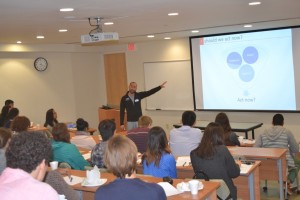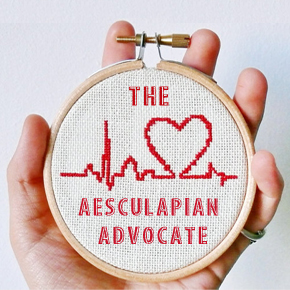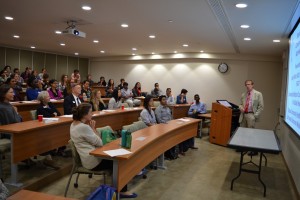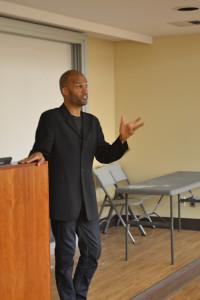During our many years of medical training, we study complex physiological processes running the gamut from acute sepsis to the equally devastating progression of chronic diseases. We spend countless hours in lectures and on the wards, attempting to gain exposure to proper medical management of bread-and-butter medical problems as well as more obscure diseases which may only affect a handful of patients annually. However, most medical schools neglect to teach one crucial area of expertise — training in advocacy skills to address social determinants of health. This omission leaves students ill prepared to handle the health disparities which cause tens of thousands of deaths every year.
It is clear that most medical students enter the profession for altruistic reasons, but along the way their idealistic goals may become worn away by the daily realities of training at busy medical centers. We oftentimes, even as medical students, become overwhelmed by various social factors such as lack of health insurance, underinsurance or inadequate access to health care, hindering our ability to treat patients effectively.
A 2012 paper published in the journal Academic Medicine describes the benefits of advocacy training as “enhancement of professionalism, support of public health, and improvement of patient care.” In recent years, growing numbers of medical schools are addressing this gap in their curricula, oftentimes with courses designed and facilitated by the medical student activists themselves.
Pioneering examples of medical advocacy training include the LEADS Curriculum at the University of Colorado School of Medicine, the Scholarly Concentration in Advocacy and Activism at Brown University Warren Alpert Medical School, the Health Justice Scholar Track at Georgetown University School of Medicine, the Stanford Public Health Advocacy Curriculum for high school students and the Boston University Advocacy Training Program.
At my own institution at the University Of Iowa Carver College Of Medicine, the Community Health Outreach elective is a two-year service learning course, “focused on increasing awareness and knowledge of social determinants of health and health as a social justice issue.” In addition to weekly lunchtime seminars throughout the first and second years of instruction, each second-year student chooses a self-directed service project to address health inequities of local under-served or vulnerable populations.
My own experience working with the University of Iowa (UI) Mobile Clinic outreach site in nearby West Liberty, Iowa on a community health project regarding diabetes education within a rural Latino community greatly influenced my decision to pursue a family medicine and community health in my future as a physician.
The goal of all advocacy curricula in medical school should be similar to the UI Mobile Clinic mission statement: to “give students access to resources, knowledge and insights they will be able to use to provide competent, compassionate care to their future patients from all backgrounds and to advocate for their patients within the sphere of their influence.”
Boston University is an example of an institution that has demonstrated a commitment to curricula beyond AAMC guidelines to produce future leaders in health care by providing students with the tools, training and opportunities to explore their interests in advocacy, health policy and public health as early as the first year.
Founded in 2012, the Boston Student Health Activist Coallition (BSHAC) is collaboration between medical students from Boston University School of Medicine, Tufts Medical Center and Harvard Medical School. This past fall, the organization held its third annual summit at the Boston Medical Center Campus. Over 230 students attended for a whirlwind day of advocacy and action.

Dan Dworkis, MD, PhD, a PGY-3 in emergency medicine at Massachusetts General Hospital speaks to medical students about advocacy.
Identifying itself as a group for Boston-area health professional students working for social justice, BSHAC conference organizer Andy Hyatt, a second-year student at Boston University School of Medicine, explained why he is so passionate about this topic: “I came to medical school to deal with poverty and systems of oppression, and I saw medicine as a way to address that. The ‘white coat effect’ grants political power, deserved or not.”
The summit had a diverse array of keynote speakers including Dan Dworkis, MD, PhD, PGY-3 in emergency medicine at Massachusetts General Hospital, and Carl Williams, JD, staff attorney at the American Civil Liberties Union.
Dr. Dworkis highlighted his own experience publishing data on the barriers to providing nebulizer treatments to residents in area homeless shelters. His study, “Barriers to Outpatient Respiratory Therapy Among Adult Residents of Emergency Shelter” was published during his time in medical school. It highlighted the inequity of prescribing nebulizer treatments, which require access to electricity, as treatment of asthma and bronchitis for homeless patients.
Mr. Williams, following an introduction of one of his clients to highlight stop-and-frisk practices in Boston, shared the following advice to become an agent for systems of change rather than systems of oppression in communities: “Show up. Come without an agenda. Pick sides with the people fighting for justice.”
BSHAC conference planner Anne Marie Williams is a third-year medical student at Harvard Medical School. While the primary goal was to bring like-minded students together, she noted: “this year’s conference was more interdisciplinary than previous years including medical and public health students, recent graduates, and young professionals of local-non profits such as Partners in Health.”
With regards to advocacy training in the health profession, Ms. Williams notes: “A lot of people go [into medicine] for idealistic reasons. Just passing classes or other technical aspects of the work can be very isolating from your original reasons. Being involved keeps you motivated to keep doing that work upon graduation.”
In the ever-changing landscape of our health systems, it is easy to see why many physicians and those in training may be disillusioned with the constant vigilance required to improve the status quo. Whether you are a shadowing a busy primary care clinician or a burgeoning surgeon intensely focused on the next case in the OR, we are of course deeply invested in the individual care of the patient in front of us. But oftentimes, taking care of our patients also involves engaging within the political and administrative systems which can either help or hinder our efforts to do what is right for our patients, for our society and for ourselves.
Image source: Photographs by Andy Hyatt at the Boston University School of Medicine.



